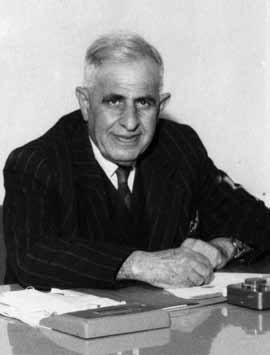NASIR, MUSA (1895-1971)
Born in Birzeit in April 1895 to a Christian family; attended the Bishop Gobat School in Jerusalem; enrolled at the AUC, graduating in Physics in 1914; during WWI, served in the civilian branch of the Ottoman army (communications, medical services and accounting); studied during the last weeks of WWI Economics and Political Science in the Robert College Library in Istanbul; served as a district officer in several Palestinian towns during the British Mandate and was heavily involved in supporting, directing and strategizing for Birzeit College, which was founded and directed by his sister Nabiha Nasir; appointed in 1944 as one of three assistants to the British General Secretary; resigned two years later in protest over the British Government’s policy vis-à-vis Jewish immigration to Palestine; opened a School for Public Administration in his home in Jerusalem, but had to close it down after 1948, when he moved permanently to Birzeit; got directly involved in the affairs of the Birzeit College, especially after his sister died in 1951; took the initiative to mobilize his townsmen and young volunteers to make a census of the displaced people of the 1948 Nakba (those statistics were later given to the International Committee of the Red Cross); later was elected to two consecutive terms in the Jordanian Parliament as one of the Palestinian representatives; also served as cabinet minister; as Minister of Transport, was responsible for building the Qalandia Airport; was also one of the two Palestinian ministers who were instrumental in foiling the attempts at a unilateral peace agreement with Israel during the late King Abdallah’s rule; addressed the UN twice as head of the Jordanian Delegation and as FM, highlighting the Palestinian cause and the refugee problem; retired from political life and concentrated all his efforts on developing Birzeit College and education in general, as well as on advocating the Palestinian cause; in 1962, was appointed head of the Educational Commission, and out in charge of establishing a university in Jordan (which became the University of Jordan in Amman); was also involved in the affairs of his Episcopalian Church and was amongst those who strove tirelessly to appoint an Arab Bishop to his Church, succeeding in this endeavor in 1958; died on 26 Aug. 1971.

ناصر، موسى (1895-1971) ولد في بيرزيت عام 1895؛ درس في مدرسة سانت جورج (المطران) في القدس؛ التحق بالجامعة الأمريكية في القاهرة، تخرج بكالوريوس في الفيزياء في عام 1914؛ خلال الحرب العالمية الأولى، عمل في الفرع المدني للجيش العثماني (اتصال، وخدمات طبية، ومحاسبة)؛ درس خلال الأيام الأخيرة من الحرب العالمية الأولى الاقتصاد والعلوم السياسية في مكتبة كلية روبرت في اسطنبول؛ عمل موظفاً إدارياً في عدة مدن فلسطينية خلال الانتداب البريطاني، وكان له دور رئيس ووضع استراتيجيات تأسيس كلية بيرزيت مع أخته نبيهة ناصر؛ عين في 1944 كواحد من بين ثلاثة مساعدين للمندوب السامي البريطاني؛ استقال بعد سنتين احتجاجاً على سياسة الحكومة البريطانية في تشجيع الهجرة اليهودية إلى فلسطين؛ فتح مدرسة في بيته في القدس للإدارة العامة، ثم أغلقها بعد النكبة الفلسطينية عام 1948، انتقل للعيش بشكل دائم في بيرزيت؛ تولى مسؤولية إدارة شؤون كلية بيرزيت، خصوصاً بعد وفاة شقيقته عام 1951؛ بادر إلى حشد العديد من أبناء قريته ومتطوعين صغار لإحصاء عدد المهجرين في نكبة 1948 (أعطيت هذه الإحصاءات لاحقاً للجنة الدولية للصليب الأحمر)؛ لاحقاً انتخب لولايتين متتاليتين عضواً في مجلس النواب الأردني؛ عمل وزيراً للمواصلات، وأشرف على بناء مطار قلنديا؛ عين مندوباً للأردن لدى للأمم المتحدة مرتين ثم وزيراً للخارجية؛ تقاعد من الحياة السياسية وركز كل جهوده على تطوير كلية بيرزيت وتطوير برامج التعليم العالي؛ في عام 1962، عين رئيساً للجنة التعليم العالي، ومسئولا عن تأسيس الجامعة الأردنية في عمان؛ وكان نشيطاً في شؤون الكنيسة الأسقفية وكان من بين الذين طالبوا بتعيين أسقف عربي للكنيسة، ونجح في هذا المسعى في 1958؛ توفي في 26 آب/ أغسطس 1971.
